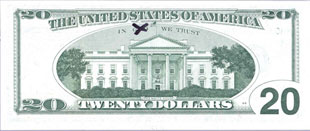| Mission Statement |
| In the News |
| Campaigns |
| Activism |
| Spotlight |
| History |
| Understanding |
| The Future |
| Atheism |
| Message Board |
| Products |
|
|
|
Cross Out God Campaign! |
||
|
|
|
History |
|
|
Constitutionality |
| The Constitutionality of the use of "God" in national mottos, pledges, and oaths is questionable, but generally able to be maintained because the use of the word "God" is claimed not necessarily endorse a specific religion. It does however, exclude many religions, and it obviously references the Christian god, because the Christian god is the only traditional god that is referred to as "God". By capitalizing the word god, it is clearly an endorsement of the Christian religion. The Constitutionality of these uses of "God" has been challenged several times, but upheld by the Supreme Court on the grounds that the term "God" does not refer to any particular god and is only ceremonial in nature, and does not claim to acknowledge any real "God". |
|
Legal Issues |
| The issue of legality in crossing out certain words on money is debatable. It is obviously not illegal to write on money. There has been a case where a warning was issues to a couple who were stamping dollars with a pot leaf stamp, but they were never charged with any crime. Defacement of currency is a crime, defined as any action that renders the money "unfit to be reissued", and holds a sentence of up to a $100 fine or up to 6 months in prison. See the links below for more details. |
|
Related Links |
|
Bureau of Engraving Statement on Defacement of Currency |


